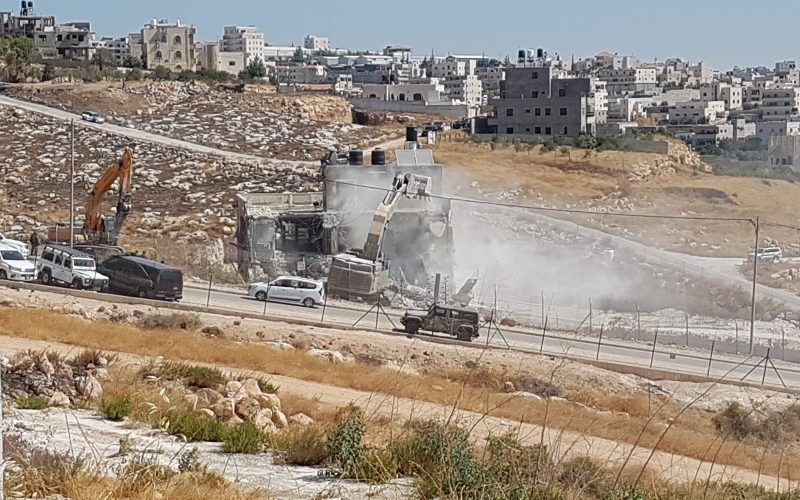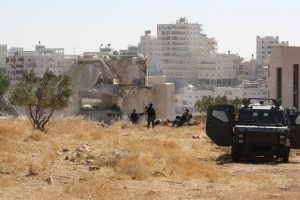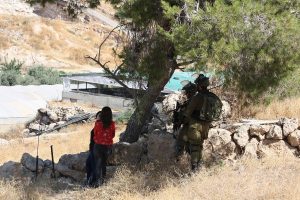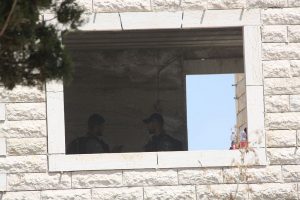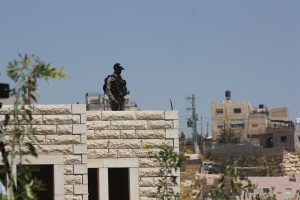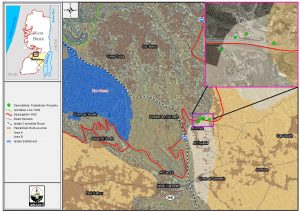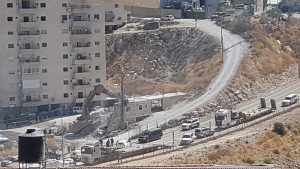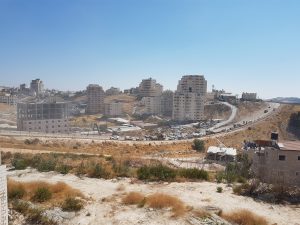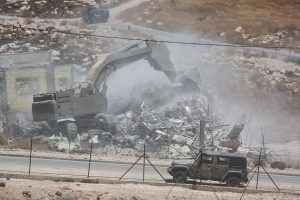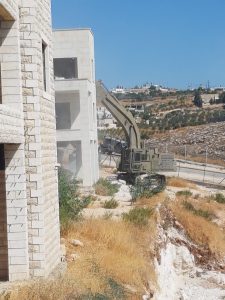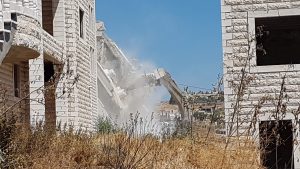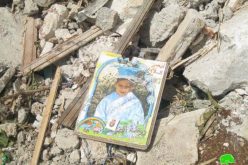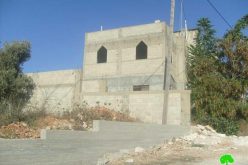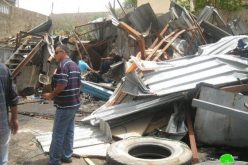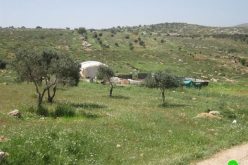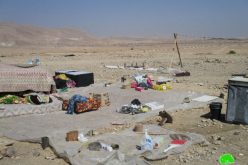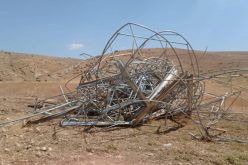At the breaking dawn of this morning, July 22, 2019, dozens of Israeli bulldozers escorted by hundreds of Israeli border police and Israeli municipality staff members stormed Wadi el-Hummus south of Sur Baher, southeast of Jerusalem, to execute demolition orders of 16 buildings holding 100 apartments that accommodates some 500 Palestinians.
Photos 1-4: Israeli border police securing the demolition process taking place in Wadi Al Hummus area near Sur Baher Town
The targeted buildings are located within areas “A” (9 buildings) and “B” (7 buildings), which, according to the signed Oslo Accords of 1995 gives the Palestinians total rights to construct and inhabit the areas without any interference from the Israeli side. Today’s; (July 22) demolitions included 9 buildings located in the area “A” and 5 buildings in area “B” and 2 buildings in area “C”.
The Army demolition squad has initiated preparation to demolish 8 buildings of the total 16 targeted for the demolition; yet, they carried out five demolitions (52 apartments) today (July 22) including one action using explosives. See Photos of demolition in Wadi Al Hummus neighborhood
Photos 5-9: Scenes of the demolition taking place in Wadi Al Hummus area near Sur Baher Town
The Israel High Court of” Justice?” confirmed a previous ruling to demolish the targeted buildings last June (22) and dismissed a petition by Palestinian residents requesting the cancellation of the demolition order. The Palestinians refused the Israeli pretext of security concerns (for location within the buffer zone of the denounced and illegally stamped segregation wall); exclaiming that it is only a pretext to push the Palestinians out of Jerusalem in the service of a political agenda aiming to demographically diminish the Palestinians existence in Jerusalem. Palestinians added that it is nearly impossible to receive construction permits from the Israeli Municipality of Jerusalem, which forces many Palestinians to build on their own in order to cope with their population growth, or leave the city, which put their residency at risk as Israel consider Palestinian Jerusalemites living outside the Israeli defined boundary of the city no longer residents of Jerusalem. It’s worth mentioning that the Israeli ministry of interior has revoked the residency right of more than 14,800 Palestinians since the year 2000 for living outside the Israeli defined Jerusalem city border.
As usual, the Israeli State and its occupation Army ignored all the warnings issued by the United Nations and human rights organizations, among others and went on to add another humanitarian violation against the Palestinian people as they intently and directly responsible for displacing dozens of families from their homes and lands.
Demolition of Palestinian homes in the West Bank and East Jerusalem is not out of the ordinary violation committed by Israel. However, the demolished homes, are located in the Palestinian controlled Area “A” and “B”, which again red flags the Israeli violations of the signed agreement and more, it evidently practice of collective punishment against the Palestinian population of the West Bank. At the same time, more than 800 thousand Israeli settlers living in 198 Israeli settlements and outposts deemed illegal by the international community and dozens of UN resolutions remain living and growing in population and construction as well.
Today’s, July 22 demolition highlights and questions the validity of the International conventions and Humanitarian laws including:
- Article 17 of the (1948) Universal Declaration of Human Rights stating: “Everyone has the right to own property alone as well as in association with others. No one shall be arbitrarily deprived of his property.”
- Section ‹G› of article 23 of the (1907) The Hague Conventions asserting:“In addition to the prohibitions provided by special Conventions, it is especially forbidden to destroy or seize the enemy’s property, unless such destruction or seizure be imperatively demanded by the necessities of war.”
- Article 53 of the Geneva Fourth Convention (1948) declaring:“Any destruction by the Occupying Power of real or personal property belonging individually or collectively to private persons, or to the State, or to other public authorities, or to social or cooperative organizations, is prohibited, except where such destruction is rendered absolutely necessary by military operations.”
- Section 1, Article 11 of the International Covenant on Economic, Social and Cultural Rights (1966):“The States Parties to the present Covenant recognize the right of everyone to an adequate standard of living for himself and his family, including adequate food, clothing and housing, and to the continuous improvement of living conditions.
This month also marks the 15th year anniversary of the International Court of Justice’s Advisory Opinion regarding the illegality of the separation wall constructed on Palestinian lands by the occupying Israeli occupation Army (IOA). Unfortunately, the ICJ’s ruling has been continuously ignored by the consecutive Israeli governments even though the Advisory Opinion is clear in its denouncing of the separation wall, and its call for Israel to dismantle the separation wall and cease all illegal occupying activities, including demolition of homes, confiscating of lands, and restricting the movement people in the West Bank and East Jerusalem.
In its advisory opinion, the Court strongly rebuked Israelis actions in creation of the security wall, and exposed Israel’s false claims that the security wall is the only option for the defense of their country.
The Advisory Opinion also declared that the occupying force (Israel) was taking illegal actions against the Palestinian people, land, and livelihood; and voted on and gave five responses (see below) to the question put forward by the General Assembly in resolution ES-10/14:-
- The construction of the wall being built by Israel, the occupying Power, in the Occupied Palestinian Territory, including in and around East Jerusalem, and its associated regime, are contrary to international law.
- Israel is under an obligation to terminate its breaches of international law; it is under an obligation to cease forthwith the works of construction of the wall being build in the oPt, including in and around East Jerusalem, to dismantle forthwith the structure therein situated, and to repeal or render ineffective forthwith all legislative and regulatory acts relating thereto, in accordance with paragraph 151 of this Opinion.
- Israel is under an obligation to make reparation for all damages caused by the construction of the wall in the OPT, including in and around East Jerusalem.
- All States are under an obligation not to recognize the illegal situation resulting from the construction of the wall and not to render aid or assistance in maintaining the situation created by such construction; all States parties to the Fourth Geneva Convention relative to the Protection of Civilian Persons in Time of war of 12 August 1949 have in addition the obligation, while respecting the United Nations Charter and international law, to ensure compliance by Israel with international humanitarian law embodied in that Convention.
- The United Nations, and especially the General Assembly and the Security Council, should consider what further action is required to bring to an end the illegal situation resulting from the construction of the wall and associated regime, taking due account of the present Advisory Opinion.
Additionally, the Court was also not persuaded by the Israeli response to claims they are not violating the 49th paragraph of the 4th Geneva Convention because of the military necessities of such establishments. In the summary of Advisory Opinion, it states that “the Court is not convinced that the destruction carried out contrary to the prohibition in that Article were rendered absolutely necessary by military operations; so as to fall within the exception”.
Furthermore, the infringements resulting from that route cannot be justified by military exigencies or by the requirements of national security or public order; The Court’s Advisory Opinion dismisses Israel’s claim that it must build the security wall but stating that the wall could be built on Israeli land, not occupied land. The Court also points out that the exceptions to the norms and conditions of international law require that there be no other alternates to maintaining national security while the Court is not convinced that the construction of the wall, along the route which is chosen, is the only way to protect Israeli national security.
The Court determines that it is Israel’s first obligation to return any confiscated lands, and only if this is not materially possible to compensate the people damaged by the wall.
Prepared by:
The Applied Research Institute – Jerusalem


